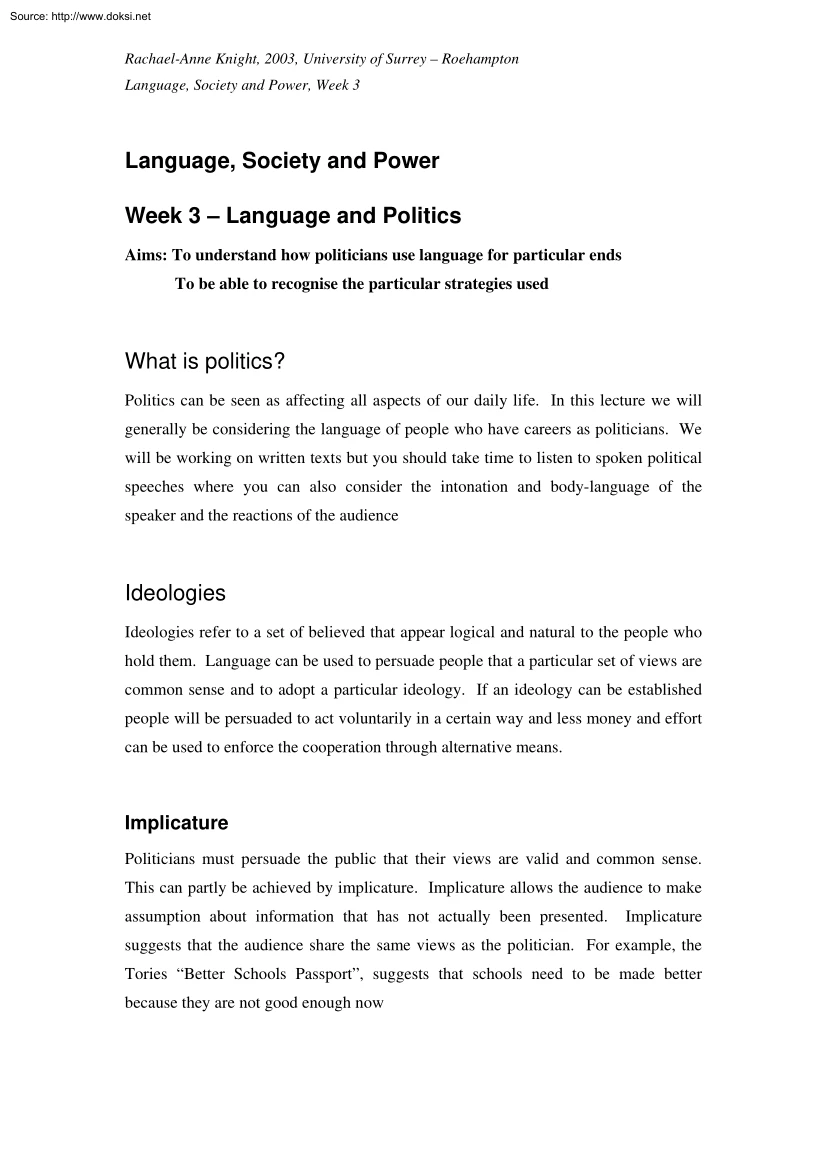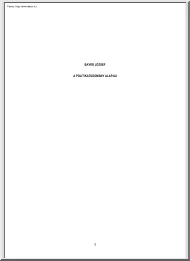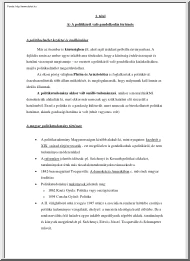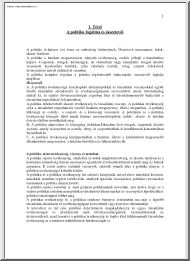Datasheet
Year, pagecount:2003, 3 page(s)
Language:English
Downloads:2
Uploaded:July 27, 2020
Size:463 KB
Institution:
-
Comments:
University of Surrey
Attachment:-
Download in PDF:Please log in!
Comments
No comments yet. You can be the first!Most popular documents in this category
Content extract
Source: http://www.doksinet Rachael-Anne Knight, 2003, University of Surrey – Roehampton Language, Society and Power, Week 3 Language, Society and Power Week 3 – Language and Politics Aims: To understand how politicians use language for particular ends To be able to recognise the particular strategies used What is politics? Politics can be seen as affecting all aspects of our daily life. In this lecture we will generally be considering the language of people who have careers as politicians. We will be working on written texts but you should take time to listen to spoken political speeches where you can also consider the intonation and body-language of the speaker and the reactions of the audience Ideologies Ideologies refer to a set of believed that appear logical and natural to the people who hold them. Language can be used to persuade people that a particular set of views are common sense and to adopt a particular ideology. If an ideology can be established people will be
persuaded to act voluntarily in a certain way and less money and effort can be used to enforce the cooperation through alternative means. Implicature Politicians must persuade the public that their views are valid and common sense. This can partly be achieved by implicature. Implicature allows the audience to make assumption about information that has not actually been presented. Implicature suggests that the audience share the same views as the politician. For example, the Tories “Better Schools Passport”, suggests that schools need to be made better because they are not good enough now Source: http://www.doksinet Rachael-Anne Knight, 2003, University of Surrey – Roehampton Language, Society and Power, Week 3 The language of deception Orwell thought that politicians can trick the public by using language to deceive. He came up with six points that he thought speakers should abide by so communication would be honest and clear. 1. Never use a metaphor, simile or other
figure of speech which you are used to seeing in print Using a metaphor makes it difficult for people to think clearly either because a well-worn phrase looses its meaning or because repeating phrases makes the ideas they contain seem common sense. 2. Never use a long word where a short one will do In English we have lots of words that are almost synonymous due to the history of the language (‘rise’: English, ‘mount’: French, ‘ascend’: Latin). The longer, usually Latin words are often used in the more academic or formal environments so using them may make a speaker sound more authoritative and superior. 3. If it is possible to cut a word out, always cut it out Using extra, unnecessary words can make the speaker sound more impressive. 4. Never use the passive when you can use the active Passive sentences sound more formal and can be harder to understand. They can also give less information than an active sentence as the agent can be omitted. 5. Never use a foreign
phrase, scientific word or a jargon word if you can think of an everyday English equivalent. Using these types of words makes the speaker sound more impressive but can make it for difficult for the audience to understand the message. 6. Break any of these rules sooner than say anything barbarous Following all these rules could lead to some very strange constructions. Orwell’s final point tries to ensure that the message is the most important thing rather than the style. Source: http://www.doksinet Rachael-Anne Knight, 2003, University of Surrey – Roehampton Language, Society and Power, Week 3 Rhetoric – the language of persuasion Figures of speech Figures of speech are representations that are not literally true, such as a ‘strong economy’. They make abstract ideas easier to think about but can help to create ideologies by linking the ideas to the public’s own experience. The three-part statement Politicians often refer to things in groups of three. For some reason
humans seem to find things in threes particularly pleasing and politicians often take advantage of this in their speeches. Tony Blair’s ‘Education, Education, Education’ is a three-part statement, although it only makes one point. Contrastive pairs Politicians may also pair together items that contrast, particularly when there is a contrast between ‘us’ and ‘them’ (usually the opposition). (Contrastive pairs and three-part statements are called ‘claptraps’ by Atkinson (1984). They are the devices most likely to draw applause during a political speech. The two can also be mixed as in Churchill’s “Never in the field of human conflict has so much been owed by so many to so few”.) The use of pronouns The use of pronouns can be used to emphasise or hide agency and responsibility. Politicians may say ‘I’ when they want to take the credit for something and ‘we’ when they want to hide their own culpability. Reference Atkinson, M. (1984) Our Masters’ Voices,
Methuen: London
persuaded to act voluntarily in a certain way and less money and effort can be used to enforce the cooperation through alternative means. Implicature Politicians must persuade the public that their views are valid and common sense. This can partly be achieved by implicature. Implicature allows the audience to make assumption about information that has not actually been presented. Implicature suggests that the audience share the same views as the politician. For example, the Tories “Better Schools Passport”, suggests that schools need to be made better because they are not good enough now Source: http://www.doksinet Rachael-Anne Knight, 2003, University of Surrey – Roehampton Language, Society and Power, Week 3 The language of deception Orwell thought that politicians can trick the public by using language to deceive. He came up with six points that he thought speakers should abide by so communication would be honest and clear. 1. Never use a metaphor, simile or other
figure of speech which you are used to seeing in print Using a metaphor makes it difficult for people to think clearly either because a well-worn phrase looses its meaning or because repeating phrases makes the ideas they contain seem common sense. 2. Never use a long word where a short one will do In English we have lots of words that are almost synonymous due to the history of the language (‘rise’: English, ‘mount’: French, ‘ascend’: Latin). The longer, usually Latin words are often used in the more academic or formal environments so using them may make a speaker sound more authoritative and superior. 3. If it is possible to cut a word out, always cut it out Using extra, unnecessary words can make the speaker sound more impressive. 4. Never use the passive when you can use the active Passive sentences sound more formal and can be harder to understand. They can also give less information than an active sentence as the agent can be omitted. 5. Never use a foreign
phrase, scientific word or a jargon word if you can think of an everyday English equivalent. Using these types of words makes the speaker sound more impressive but can make it for difficult for the audience to understand the message. 6. Break any of these rules sooner than say anything barbarous Following all these rules could lead to some very strange constructions. Orwell’s final point tries to ensure that the message is the most important thing rather than the style. Source: http://www.doksinet Rachael-Anne Knight, 2003, University of Surrey – Roehampton Language, Society and Power, Week 3 Rhetoric – the language of persuasion Figures of speech Figures of speech are representations that are not literally true, such as a ‘strong economy’. They make abstract ideas easier to think about but can help to create ideologies by linking the ideas to the public’s own experience. The three-part statement Politicians often refer to things in groups of three. For some reason
humans seem to find things in threes particularly pleasing and politicians often take advantage of this in their speeches. Tony Blair’s ‘Education, Education, Education’ is a three-part statement, although it only makes one point. Contrastive pairs Politicians may also pair together items that contrast, particularly when there is a contrast between ‘us’ and ‘them’ (usually the opposition). (Contrastive pairs and three-part statements are called ‘claptraps’ by Atkinson (1984). They are the devices most likely to draw applause during a political speech. The two can also be mixed as in Churchill’s “Never in the field of human conflict has so much been owed by so many to so few”.) The use of pronouns The use of pronouns can be used to emphasise or hide agency and responsibility. Politicians may say ‘I’ when they want to take the credit for something and ‘we’ when they want to hide their own culpability. Reference Atkinson, M. (1984) Our Masters’ Voices,
Methuen: London





 Just like you draw up a plan when you’re going to war, building a house, or even going on vacation, you need to draw up a plan for your business. This tutorial will help you to clearly see where you are and make it possible to understand where you’re going.
Just like you draw up a plan when you’re going to war, building a house, or even going on vacation, you need to draw up a plan for your business. This tutorial will help you to clearly see where you are and make it possible to understand where you’re going.